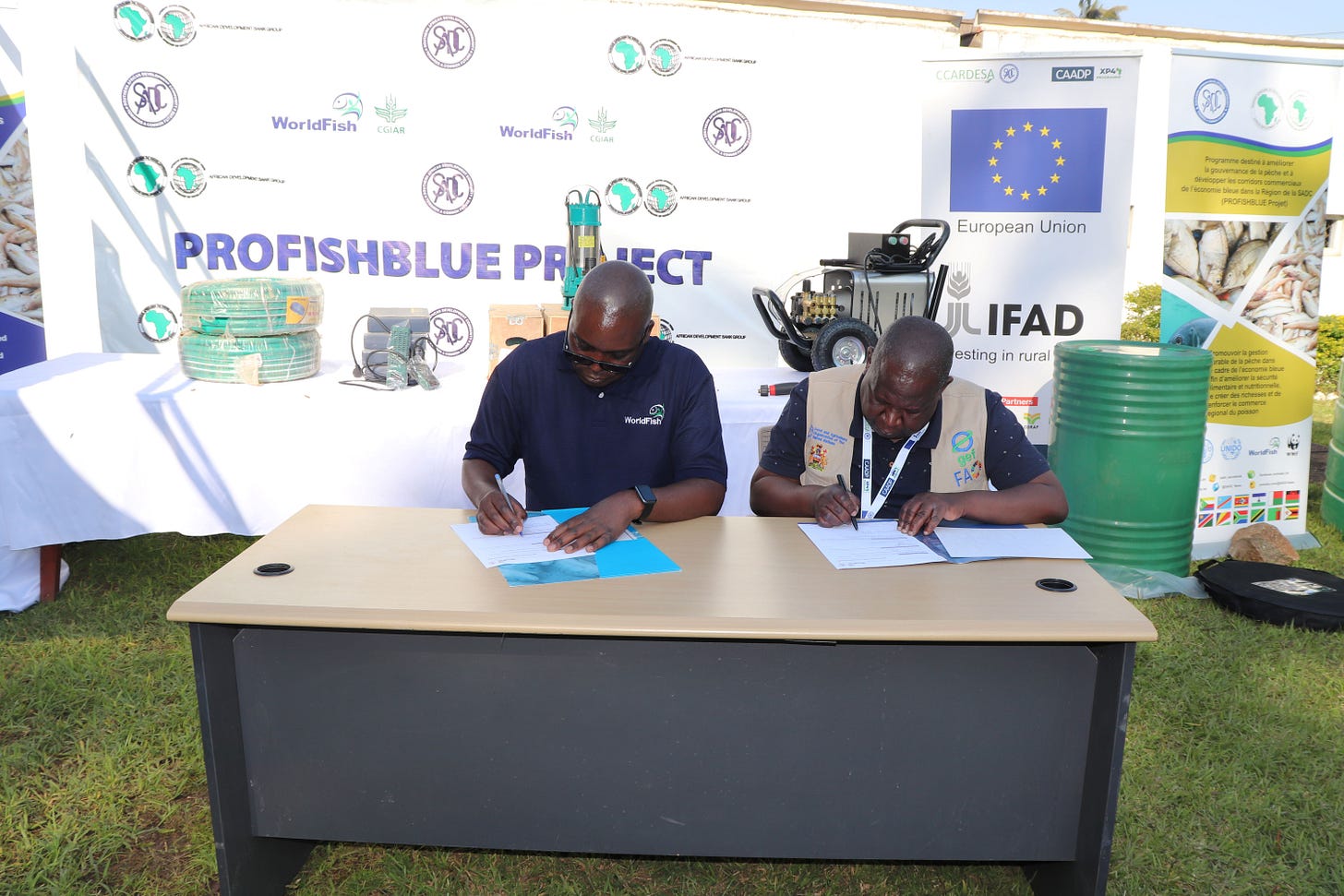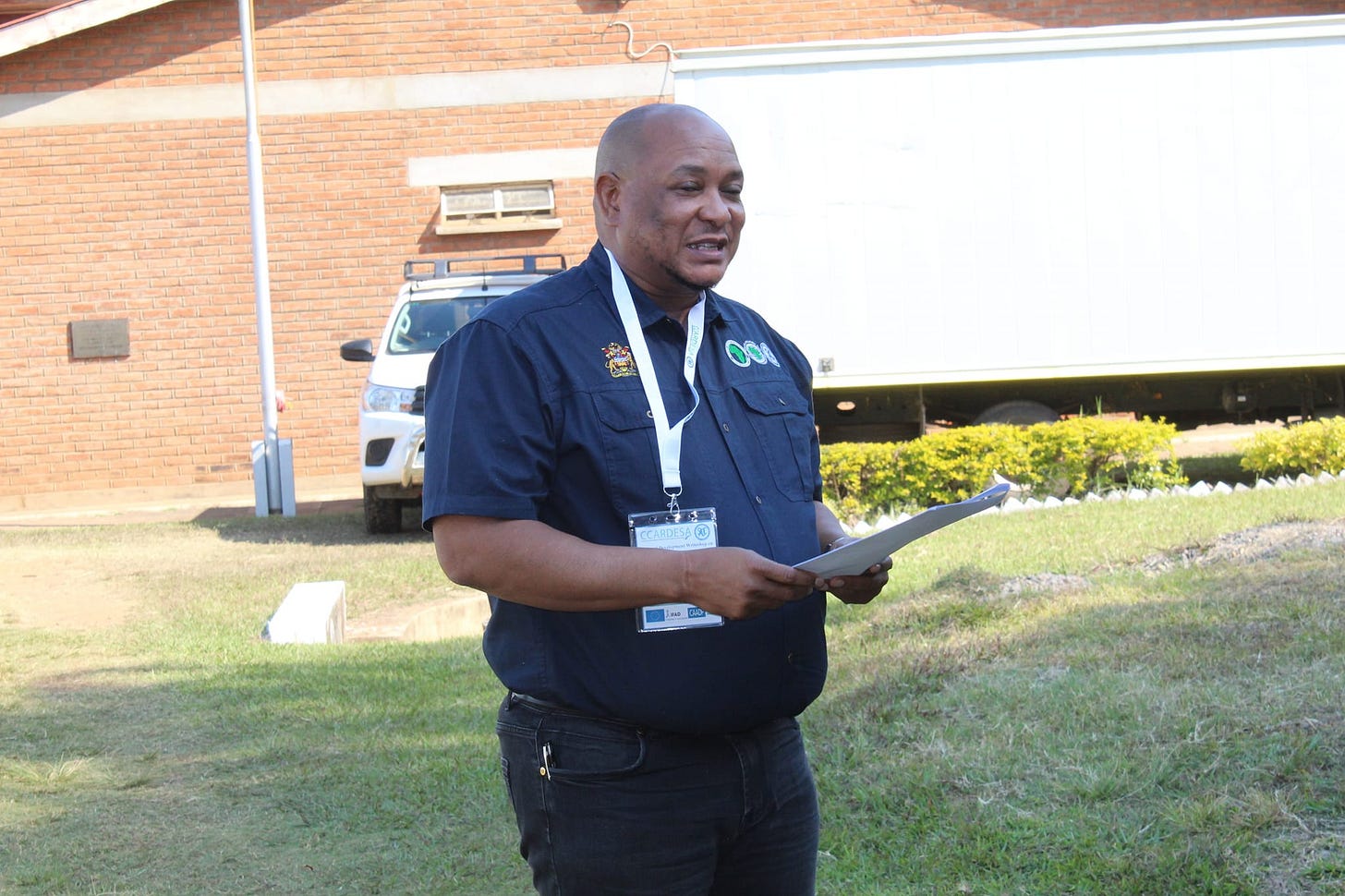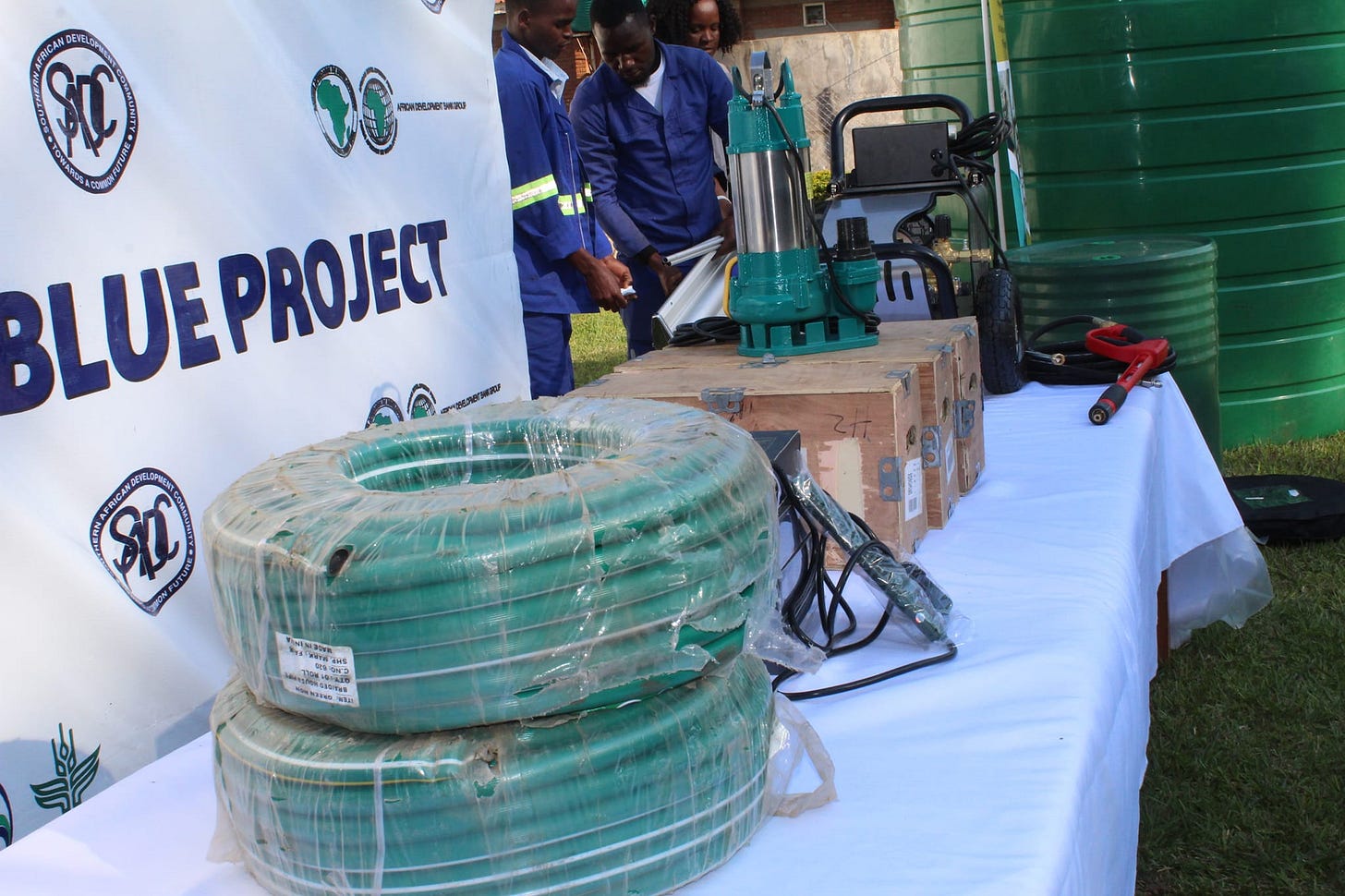FISH GENETIC IMPROVEMENT PROGRAMMES
Enhancing Productivity and Growth perfomance of indigenous Tilapia Fish species in the SADC region
Joseph Magwira, Ministry of Natural Resources and Climate Change Director of Adminstration (Right) and Dr Victor Siamudaala, the Country Director for Southern Africa at WorldFish signing hatchery equipment handover documents on July 22, 2024.
ZOMBA (Malawi) - The Southern African Development Community (SADC) with financial support from the African Development Bank (AfDB) is implementing a Programme for Improving Fisheries Governance and Blue Economy Trade Corridors in the SADC region (PROFISHBLUE Project) which, among others, has a sub-component that is promoting fish genetic improvements that aims to increase productivity and enhance growth performance of selected indigenous tilapia fish species in the region.
Recently, the SADC Secretariat in partnership with WorldFish Centre, an international organization working to transform aquatic food systems to reduce hunger, malnutrition and poverty handed over fish hatchery equipment to the Malawi Government through Domasi Aquaculture Centre (formerly National Aquaculture Centre) in the southern region Zomba district under the sub-component that seeks to ‘Promote genetic improvement, aquaculture programs and regional hatchery support and training.’
The Domasi Aquaculture Centre serves as the breeding nucleus for the Genetic Improvement Programmes (GIP) aimed at enhancing the quality for Shire tilapia locally called Makumba, a significant fish species for Malawi and neighbouring countries.
Some of the handed over equipment includes an industrial pressure washer, fish tank heaters, a 500 litre header tank, pipes and submersible drainage pumps and fine net mesh procured with the facilitation from the WorldFish in collaboration with the Department of Fisheries.
The equipment is vital in genetic improvement program implementation because the heated recirculatory hatchery will enable the centre to produce more fingerlings during the cold season and reduce mortality. Ordinarily, hatching of eggs takes up to two weeks during the cold season but with the equipment the duration will be reduced by half. This will also effectively promote growth performance while reducing mortality of fish fry which is one of the critical stages of the program.
Additionally, the new equipment will improve the biosecurity issues of the program. The high value industrial pressure washer will ensure that hapas, harvesting nets and other equipment are thoroughly washed, clean and hygienic while the header tank will ensure that clean water from the biofilter is available at all times in the hatchery.
Dr Victor Siamudaala, the Country Director for Southern Africa at WorldFish, emphasised that the equipment is aimed at assisting the SADC region and Malawi in the efforts to enhance the productivity of aquaculture sector.
He emphasized that the initiative was intended to stimulate the Genetic Improvement Programme (GIP) of indigenous tilapia fish species in SADC and create employment as well as business opportunities throughout the entire aquaculture value chain for the region.
Handing over the equipment, Dr Motseki Hlatshwayo, the Technical Advisor on Fisheries at the SADC Secretariat and the PROFISHBLUE Project Manager, applauded WorldFish for doing an extra ordinary work and their support in developing aquaculture and genetic programmes in the SADC region. Dr. Hlatshwayo emphasized that the equipment and its accessories would boost fish production, especially for Shire tilapia, which is one of the priority species identified under the SADC Regional Fish genetic Improvement Programme by SADC Ministers responsible for Fisheries and Aquaculture in 2017. Apart from Malawi’s Shire Tilapia species, the project is also genetically enhancing quality for other tilapia species found in Zambia, Tanzania and Mozambique.
Dr Motseki Hlatshwayo, the Technical Advisor on Fisheries at the SADC Secretariat and the PROFISHBLUE Project Manager.
The SADC Fisheries Technical Advisor stated that although the equipment was handed over to Malawi, it would benefit other SADC member states as the centre is a regional initiative which they can leverage for research and training.
Domasi Aquaculture Centre is one of the pivotal institutions in the country's efforts to enhance fish farming and promote sustainable aquaculture practices. It is mandated to conduct research that spearhead development of commercial and subsistence aquaculture. Its research agenda is centered on solving problems related to fish farming and management of small water bodies recommended for fish farming.
A fisheries officer working inside the fish hatchery
Speaking when he received the equipment on behalf of Malawi Government, Mr. Joseph Magwira, the Director of Administration in the Ministry of Natural Resources and Climate Change, commended SADC Secretariat and the WorldFish for consistently supporting SADC Member States, particularly Malawi, in the pursuit of enhancing fish and aquaculture production.
Mr. Magwira who was representing Dr. Yusuf Mkungula, the Principal Secretary for the ministry, emphasised that the SADC initiative aligns with the realisation of the goals of the Malawi Development Agenda 2063, which prioritises product diversification, value addition in export products, and overall competitiveness.
Aquaculture is the fastest-growing food production sector in the world but most farmers in the SADC region, Malawi inclusive, lack of quality fish species with fast growth rates and resistance to common diseases. It is against this background that Magwira commended SADC for the program that focuses on selective breeding of the tilapia species will help address the challenges by leveraging advanced scientific techniques and local knowledge to enhance the genetic quality of fish stocks, thereby increasing productivity, improving resilience to diseases, and boosting the overall sustainability of fish farming.
“This program aims to improve growth rates, survival rates, and resistant to diseases. By improving these traits, we can ensure that our fish farms are more productive and profitable, providing a reliable source of income for our farmers,” he said.
Additionally, the program is committed to preserving the genetic diversity of native fish species. The genetic diversity is critical for the long-term health and resilience of fish populations and by maintaining a broad genetic base, we can ensure that our fish are better able to adapt to changing environmental conditions and resist emerging threats.
The program has the potential to create significant economic opportunities. Increased fish production can stimulate growth in related sectors, such as feed production, processing, and marketing. This, in turn, can generate jobs and boost incomes, particularly in rural areas where economic opportunities are often limited.
Furthermore, the Fish Genetic Improvement Program is aligned with Malawi’s national development goals and international commitments. It supports the country’s efforts to achieve food security, reduce poverty, and promote sustainable development and by increasing fish production, the country can enhance the availability of affordable, high-quality protein for its people, contributing to better nutrition and health outcomes·
The Fish Genetic Improvement Program therefore represents a forward-thinking approach to addressing some of the most pressing challenges facing SADC fisheries sector. However, the success of the program depends on the collective efforts of all stakeholders, including governments, research institutions, non-governmental organizations and most importantly, the fish farmers.
The Director of Fisheries, Dr. Hastings Zidana echoed the ministry representative in thanking the SADC PROFISHBLUE for supporting the fisheries sector in the country. He also commended fisheries department staff for their dedication to duty and urged them to take good care of all equipment for the centre to continue registering tangible results.
The Director of Fisheries, Dr. Hastings Zidana showing SADC fisheries sector country represenatives a new feedmill being installed at Domasi Aquaculture Centre
PROFISHBLUE Project, is being implemented in seven SADC Member States namely; the Democratic Republic of Congo, Madagascar, Malawi, Mozambique, United Republic of Tanzania, Zambia and Zimbabwe.
The project aims to promote sustainable management of fisheries resources within the blue economy context to improve food and nutritional security, create employment through value chain activities, facilitate intra-regional trade, and build adaptive capacity to climate change for resilience.
Part of the equipment handed over to facilitate fish genetic improvement at Domasi Aquaculture Centre in Zomba, Malawi.








